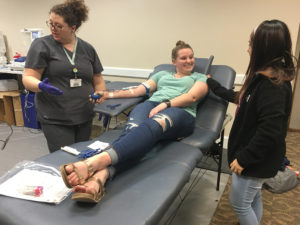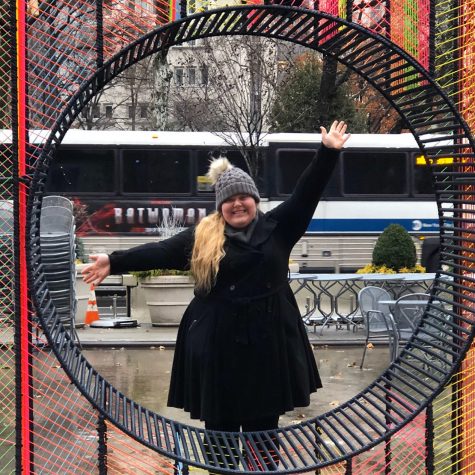
The blood drive, hosted by Kappa Alpha Order, will continue on Jan. 25 from 10 a.m. — 3 p.m. in the Clark Student Center in the Comanche suites. Since the blood drive kicked off on Jan. 23, 22 people have donated either pints, plasma or platelets.
Texas Blood Institute staff facilitate the donations while KA members and volunteers run the donations registration.
For every pint of blood donated up to three lives can be saved, and according to Jordan Nieto, nursing freshman and philanthropy chair of KA, the event not only helps save lives, but adds purpose to the people who donate.
“This is a ripple affect, and I want to affect people out from this,” Nieto said. “This takes time and it takes effort, but think about all the good you’re doing. I’m definitely excited to see where this goes not just from a fraternity standpoint, but from an organizational standpoint for the campus.”
According to Kristin Roberts, mobile blood institute supervisor, about 30 people donate a day when organization members hold blood drives on campus, and Nieto said KA members have a goal to reach 50 students on Thursday.
“We are here for a cause, so we came in with a bunch of ideas with my rush class, so I really want to build on top of those,” Nieto said. “Students don’t have to make an appointment, but we have that as an option.”
Because few students make appointments, Roberts said sometimes the job falls on the staff to reach students to donate.
“It’s hard to get students to make appointments because they have class and they have different things to do, but we try to get people in and out as quickly as possible,” Roberts said. “A lot of times, the free shirt is the catch for them. We tell people there are lives being saved and that will change their mind if they are on the fence about donating, but the free shirt really brings people in.”
According to Lauren Tisdale, special education junior, she liked knowing that if she donated she would help people in need.
“This was my first time, and I thought it was going to be worse than it was. I was pretty nervous, but the nurses were so kind to me, and that helps a lot. I had a friend talk to me, and that helped,” Tisdale said. “I never got to donate blood before, and so when this opportunity came up, I was glad I was able to be confident enough to do it. You just have to remember where this is going and who it helps.”
With the support of her friend Avery Trevino, biology freshman, and Jessica Hernandez, nursing sophomore, Tisdale said the process was easier than she expected. According to Trevino, she has donated blood several times over the last few years and said she is proud of the students that choose to take the step to donate.
“Every once in awhile, I will get a call from Texas Blood Institute saying they need me to donate, and I feel good about saving lives. It’s not as scary as it seems. You don’t see the needle, you don’t really feel it, it doesn’t hurt and it’s not as big of a deal as you might think it is. A lot of people hear the horror stories of passing out, but they don’t hear the good stories because they aren’t as memorable since they went smoothly,” Trevino said.
The time it takes to donate varies depending on the wait and demand on each blood type, but Roberts said it normally takes between 45 minutes to an hour. Because AB red blood cells are only accepted by other AB blood, Roberts said they suggest students with that blood consider donating their plasma because it is universally accepted. O-neg blood types can be accepted by any types, so Roberts said they suggest they donate red blood cells.
Should students choose to donate, Roberts said there are a few health reminders to be aware of for Thursday.
“Eating is really important, especially if people are wanting to donate,” Roberts said. “You want to stay hydrated from day to day, and that can affect your veins and how able we are to draw.”











